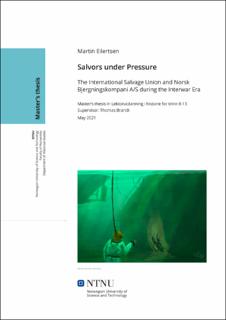| dc.contributor.advisor | Thomas Brandt | |
| dc.contributor.author | Martin Eilertsen | |
| dc.date.accessioned | 2021-09-13T16:10:31Z | |
| dc.date.available | 2021-09-13T16:10:31Z | |
| dc.date.issued | 2021 | |
| dc.identifier | no.ntnu:inspera:80290154:11937699 | |
| dc.identifier.uri | https://hdl.handle.net/11250/2775778 | |
| dc.description.abstract | Med all sin ustabilitet, bade økonomisk og politisk, var mellomkrigstiden også en tid for internasjonalt samarbeid og teknologisk utvikling. Samarbeid på tvers av grenser, enten gjennom kartell, trust, interesseorganisasjoner og så videre, spredte seg også til bergingsindustrien. Bergingsindutrien var en sterkt privatisert beskjeftigelse, som trengte en jevn strøm av forliste skip, men som fortsatt kunne berges, hvor de opererte etter den juridiske basisen «No cure – no pay». Samtidig, sparte de både redere og assurandører for store verdier som ellers hadde gått tapt i havet. Grunnet lave bergingslønner, tok Norsk Bjergningskompani, sammen med flere andre bergingsselskap, og dannet The International Salvage Union (ISU). Hensikten var å bedre de økonomiske omstendighetene for bergerne. Deres hovedtema var bergingskontrakten Lloyd’s Open Form (LOF) og voldgiftsmenn, spesielt voldgiftsmennene i Lloyd’s of London. At bergerne dannet en organisasjon for samarbeid kan virke rart, spesielt med tanke på deres tøffe og direkte form for konkurranse, men den hadde sine suksessmomenter. Denne oppgaven bruker arkivmaterialet etter Norsk Bjergningskompani til å studere forholdene innad i ISU, og hvordan de valgte å reagere på fallende markedspriser, færre skip i nød, og ny og tryggere maritim handel. Det er en kvalitativ studie, med innslag av kvantitative elementer. Hensikten er å vise at ISU var etablert nesten som en direkte konsekvens av mistillit til LOF, at lave markedspriser førte til lavere bergingslønner, og at det var en liten, men konsistent, reduksjon av antall av skip som trengte bergernes ekspertise, på grunn av ny teknologi, og lover og regler for tryggere skipshandel. Reaksjonene fra bergerne i ISU involverte planer om å midlertidig stoppe bergingsarbeid, men de foretrakk dialog og forhandlinger med Lloyd’s fremfor direkte og samkjørte aksjoner. Oppgaven presenterer også kort hvordan trendene i mellomkrigstiden fortsatte etter andre verdenskrig. | |
| dc.description.abstract | With all its instabilities, both economic and political, the interwar era was also a time of international cooperation and technological developments. Cross-border cooperation within the industries, be it cartels, trusts, interest organizations, and so on, also spread to the salvage industry. The salvage industry was a highly privatized business which required a steady supply of stricken, but salvageable, vessels, whereby they operated on the legal basis of “No cure – No pay”. At the same time, they saved both owners and underwriters large values which would otherwise have been lost at sea. Spurred on by low salvage rewards, the Norwegian salvage company, Norsk Bjergningskompani, together with several other salvage companies, established the International Salvage Union (ISU). The purpose was to create a more favourable economic environment for the salvors. Their main concern was the salvage contract Lloyd’s Open Form (LOF) and the arbitrators, especially the arbitrators of Lloyd’s of London. Salvors forming a union was perhaps a strange gesture, considering the rough and direct nature competition had within the salvage industry, but it did have its moments of success. This thesis uses the archive material left by Norsk Bjergningskompani to study the relations within the ISU, and how they chose to respond to falling market prices, decreasing tonnage of ships in distress, and new and safer shipping. It is a qualitative study which involves quantitative elements. The study showed that the ISU was created almost as a direct consequence of unhappiness with the LOF, that low market prices did lower salvage rewards, and that there was a slight, but steady, decrease of ships requiring the salvors’ expertise, due to newer technology and conventions for safer shipping. The reactions from the salvors involved plans of halting salvage services, however they preferred dialogue and negotiations with Lloyd’s as opposed to direct, coordinated action. The thesis also shortly presents how the aforementioned trends continued in post-war Europe. | |
| dc.language | eng | |
| dc.publisher | NTNU | |
| dc.title | Salvors under Pressure - The International Salvage Union and Norsk Bjergningskompani A/S during the Interwar Era | |
| dc.type | Master thesis | |
